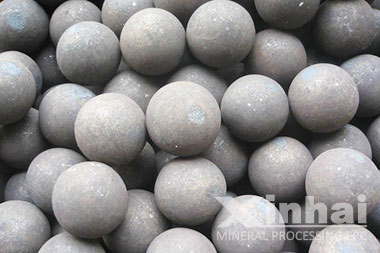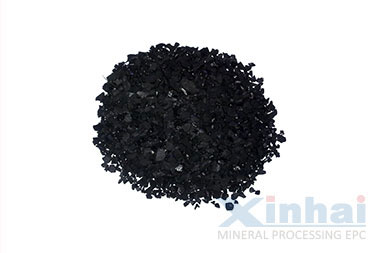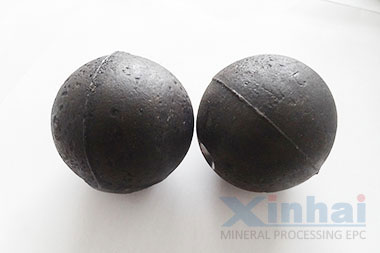Advantages
1. The defects produced in smelting process will be eliminate by forging which optimizes the microstructure and preserve the integrity of metal flow. Forging mechanical performance is better than that of the same material casting.
2. The wear-resistance of Forged steel ball completely depends on the material. Xinhai wear-resistant steel ball adopts excellent quality steel which has the advantages of good impact resistance, strong toughness, and good wear resistance, etc.
Application
Iron ore, copper, gold, Cu-Pb-Zn and other wet grinding field.
Production Process Flow of Forging Steel Ball
Inspection of raw materials--Heating and melting of Intermediate frequency furnace---Spin into ball --- Quenching----Tempering----Testing---Package
The mechanical properties of forged steel balls
| Diameter of Steel Ball (MM) |
A Material |
B Material |
C Material |
D Material |
| Core Hardness |
Internal Hardness |
Impact Index |
Core Hardness |
Internal Hardness |
Impact Index |
Core Hardness |
Internal Hardness |
Impact Index |
Core Hardness |
Internal Hardness |
Impact Index |
| φ25 |
60-65 |
58-63 |
≥12J/CM2 |
— |
— |
— |
— |
— |
— |
— |
— |
— |
| φ30 |
60-65 |
55-60 |
≥12J/CM2 |
— |
— |
— |
— |
— |
— |
— |
— |
— |
| φ35 |
60-65 |
55-60 |
≥12J/CM2 |
— |
— |
— |
— |
— |
— |
— |
— |
— |
| φ40 |
60-65 |
55-63 |
≥12J/CM2 |
60-65 |
60-65 |
≥12J/CM2 |
— |
— |
— |
— |
— |
— |
| φ50 |
60-65 |
45-50 |
≥12J/CM2 |
60-65 |
60-65 |
≥12J/CM2 |
— |
— |
— |
— |
— |
— |
| φ60 |
60-65 |
42-47 |
≥12J/CM2 |
60-65 |
60-65 |
≥12J/CM2 |
— |
— |
— |
— |
— |
— |
| φ70 |
60-65 |
40-45 |
≥12J/CM2 |
60-65 |
60-65 |
≥12J/CM2 |
— |
— |
— |
— |
— |
— |
| φ75 |
60-65 |
40-45 |
≥12J/CM2 |
60-65 |
60-65 |
≥12J/CM2 |
— |
— |
— |
— |
— |
— |
| φ80 |
60-65 |
37-42 |
≥12J/CM2 |
60-65 |
60-65 |
≥12J/CM2 |
— |
— |
— |
— |
— |
— |
| φ90 |
60-65 |
37-42 |
≥12J/CM2 |
58-63 |
52-60 |
≥12J/CM2 |
— |
— |
— |
— |
— |
— |
| φ100 |
58-63 |
37-42 |
≥12J/CM2 |
53-58 |
42-58 |
≥12J/CM2 |
58-62 |
58-60 |
≥14J/CM2 |
60-65 |
60-65 |
≥14J/CM2 |
| φ110 |
55-63 |
35-40 |
≥12J/CM2 |
53-58 |
45-50 |
≥12J/CM2 |
58-62 |
58-60 |
≥14J/CM2 |
60-65 |
60-65 |
≥14J/CM2 |
| φ120 |
55-63 |
35-40 |
≥12J/CM2 |
53-58 |
45-50 |
≥12J/CM2 |
55-62 |
58-60 |
≥14J/CM2 |
60-65 |
60-65 |
≥14J/CM2 |
| φ125 |
50-55 |
35-40 |
≥12J/CM2 |
53-58 |
45-50 |
≥12J/CM2 |
55-62 |
52-58 |
≥14J/CM2 |
60-65 |
58-63 |
≥14J/CM2 |
| φ130 |
50-55 |
35-40 |
≥12J/CM2 |
53-58 |
40-45 |
≥12J/CM2 |
55-58 |
50-55 |
≥14J/CM2 |
60-65 |
58-63 |
≥14J/CM2 |
| φ140 |
— |
— |
≥12J/CM2 |
53-58 |
40-45 |
≥12J/CM2 |
55-58 |
45-55 |
≥14J/CM2 |
60-65 |
55-60 |
≥14J/CM2 |
| φ150 |
— |
— |
≥12J/CM2 |
53-58 |
40-45 |
≥12J/CM2 |
55-58 |
40-45 |
≥14J/CM2 |
60-65 |
53-58 |
≥14J/CM2 |
Try to improve the hardness until the ball is broken.
The ball with diameter 100mm is used in impact fatigue test; the test height is 7.5m; the impact times of the ball with other diameter are calculated by this formula.
N=10000×100/D, N is test time, and D is diameter




 Consult
Consult
 Leave Message
Leave Message mhxu@xinhaimining.net
mhxu@xinhaimining.net


